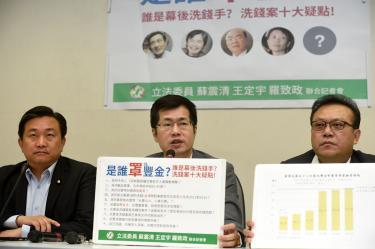US authorities had warned Mega International Commercial Bank’s New York branch that it had violated US money laundering regulations as early as 2013, after the bank dramatically increased the size of loans to businesses affiliated with the Chinese Nationalist Party (KMT), Democratic Progressive Party (DPP) legislators said yesterday.
The lawmakers said they wondered if the KMT had been involved in money laundering to hide its assets.
DPP Legislator Wang Ding-yu (王定宇) cited an anonymous source as saying that the New York State Department of Financial Services in 2013 filed a consent order to ask the branch to take corrective actions after failing to comply with US regulations against money laundering.
That was prior to the department’s recent report about the New York branch’s activities last year, suggesting Mega International’s management had been aware of the branch’s failure to comply for a few years, Wang said.
The department last week fined the New York bank US$180 million for not complying with money laundering regulations, and failing to heed the order and take corrective measures.
The Financial Supervisory Commission (FSC) should have been aware of the matter in 2013, because government representatives were members of the state-controlled bank’s board of directors, he said.
“The bank and the government’s unwillingness to take immediate action on the bank’s obvious violations suggests that there was a group behind the money laundering activity,” he said.
DPP Legislator Su Chen-ching (蘇震清) said the bank increased the size of its loan to Central Investment Co — a KMT holding company — and its affiliated companies from NT$3.68 billion (US$116.07 million at the current exchange rate) in 2010 to NT$11.19 billion last year.
The activities occurred when Mckinney Tsai (蔡友才) was chairman of the bank. He had been appointed by former president Ma Ying-jeou (馬英九).
“Central Investment’s paid-in capital was just NT$11 billion, so why did Mega International Commercial Bank allow the company to borrow more money than its capital,” Su said. “If this is not hollowing out, what is?”
The DPP lawmaker said the case must be handled carefully to prevent the KMT from hiding more assets through secret channels.
DPP Legislator Lo Chih-cheng (羅致政) said the money laundering and the increase to Central Investment’s loan occurred when close Ma aide King Pu-tsung (金溥聰) was serving as the nation’s representative to Washington.
He also questioned Mega bank’s appointment of Ma’s wife, Chow Mei-ching (周美青), to a high-level position at the bank’s charity foundation and payment for her bodyguards.
Lo said the timing of Tsai’s resignation in April, just months before the scandal broke, raised the question of whether Tsai was aware of and deliberately concealed the violations.
The DPP lawmakers called on Premier Lin Chuan (林全), who on Sunday ordered the FSC to form a committee to investigate the issue, to commission a third-party agency to direct the investigation and exclude the FSC, which they said might be involved in money laundering.
They also urged investigators to identify the bank’s customers and whether its other overseas branches have been engaged in illegal activities.
Source: Taipei Times - 2016/08/24





















